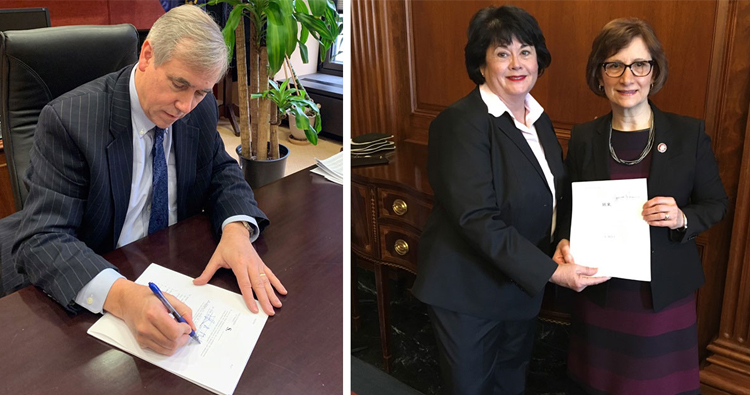
On March 7, the Alan Reinstein Ban Asbestos Now Act of 2019 (ARBAN) was introduced in both the House and Senate. The bill was sponsored by Democratic Sen. Jeff Merkley, of Oregon, Energy and Commerce Chairman Rep. Frank Pallone, Jr., D-N.J., Democratic Rep. Suzanne Bonamici, of Oregon and Rep. Elissa Slotkin, D-Mich. Ten senators and 22 representatives co-sponsored the bill, all Democrats.
The bill would ban asbestos in America within one year, including any mixture or article containing asbestos, and products contaminated by asbestos. There would be no more importation of asbestos, and ARBAN would provide a blueprint for policy makers to deal with our nation’s extensive history of asbestos use.
“I’m proud to lead this bill that would ensure this toxic chemical stays out of our homes and our communities,” said Rep. Slotkin. “We need to treat environmental security like homeland security – and the fact that the use and purchase of asbestos is not banned by the EPA is a threat to our families’ and kids’ safety and health.”
 The bill is named after Alan Reinstein, a man who died from mesothelioma, a lethal cancer caused by exposure to asbestos. His widow, Linda Reinstein, is the President and CEO of the Asbestos Disease Awareness Organization (ADAO). Since Alan passed in 2006, Linda and ADAO have campaigned tirelessly to get the dangerous carcinogen banned in America.
The bill is named after Alan Reinstein, a man who died from mesothelioma, a lethal cancer caused by exposure to asbestos. His widow, Linda Reinstein, is the President and CEO of the Asbestos Disease Awareness Organization (ADAO). Since Alan passed in 2006, Linda and ADAO have campaigned tirelessly to get the dangerous carcinogen banned in America.
In a statement applauding the bill’s introduction, Reinstein asserted:
“[ARBAN] will take long-overdue action to stop hundreds of tons of raw asbestos imports and asbestos containing products from entering the U.S. It will protect all Americans — workers, consumers, and children — from being exposed to this deadly threat.”
Getting this bill on into the congressional conversation is important, and Simmons Hanly Conroy supports the continued efforts of ADAO and dedicated members of Congress who aim to protect consumers. As sensible as this legislation is, there are forces in Washington that have successfully delayed an asbestos ban in the United States for decades.
Understanding the Alan Reinstein Ban Asbestos Now Act of 2019
If this bill is signed into law, it will start the country down the long road toward becoming asbestos-free. This will not be easy, but it will be worth it. According to the World Health Organization (WHO), there is no “safe” level of exposure to asbestos, and the risk of developing mesothelioma, lung cancer or asbestosis is lifelong.
The number of people affected by asbestos exposure is rising, and there are approximately 40,000 U.S. deaths each year as a result of asbestos-related diseases like mesothelioma. Because mesothelioma is so difficult to diagnose and has a latency period of 10-50 years, there are likely tens of thousands of people who do not yet know they are sick with an incurable cancer.
Looking at the facts, it is clear that banning asbestos alone will not adequately address the widespread risks left over from a century of global asbestos use. ARBAN is not simply ban — it includes mandates and provisions that will help protect the public from the asbestos that is already here. The updated Alan Reinstein Ban Asbestos Now Act will allow Congress to:
- Ban the importation, manufacture, processing and distribution of all forms of asbestos, asbestos-containing mixtures and asbestos-contaminated products within 12 months.
- Establish a new “Right-to-Know” program that requires companies currently using asbestos to disclose how much they use, how it is used and who is exposed.
- Require federal agencies to evaluate the risk of legacy asbestos that exists in residential, commercial, industrial, public and school buildings.
- Impose these requirements on all varieties of asbestos, including chrysotile, actinolite, amosite, anthophyllite, crocidolite, tremolite, richterite and winchite.
It is going to take time to realize the goals outlined in ARBAN, but if lawmakers pass this bill, it would provide a sensible framework to protect future generations and save countless lives from a deadly mineral that has already caused so much preventable devastation.
Support ARBAN and Global Asbestos Awareness Week
On March 5, the U.S. Senate voted unanimously to designated April 1-7 “National Asbestos Awareness Week.” The events that make up this week will include gatherings and conferences to raise awareness about the importance of addressing asbestos.
Building on this momentum will be important. The last version of ARBAN did not progress beyond its introduction to Congress. In order to bring this urgent legislation to a vote, members of Congress will need to be reminded about the dangers of asbestos.
ADAO encourages people to make their voices heard. Supporters of the bill can use this website to get in touch with their senator or representative and tell them to support ARBAN. ADAO also encourages people affected by asbestos and mesothelioma to engage with their blog or to share their own story on social media.
With enough people calling for change in Washington, we can put the ugly history of asbestos in the rear-view mirror and begin building a healthier country together.
You can follow all ARBAN legislative developments and join in the conversation by using the hashtag #ARBAN on Facebook and Twitter, and by following ADAO President and CEO Linda Reinstein @Linda_ADAO.
